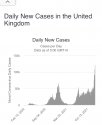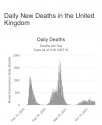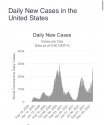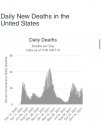A thought experiment:
If the billions of people throughout the ages who have died from pandemics could rise from their graves and live now, what would their attitudes be towards getting vaccinated?
IMO those of us alive in the 20th and 21st centuries are the beneficiaries of the doctors and scientists who came before us, and enabled us to live longer than anyone could have expected in times past.
I think of the incremental discoveries made by the brilliant people who came before us, leading us to live in a time and place when we know so much more about disease and how to prevent or cure at least many of them.
When Jenner figured out that the cow maids were not developing smallpox because they’d had the less deadly cowpox, and he invented a vaccine (from the word for cow) from their pustules that protected the recipients from smallpox. When Lister determined that sterilization of surgical instruments, as well as getting doctors to wash their hands, would end the massive death rate that surgery caused due to bacterial infection. When John Snow observed that Londoners who lived near the Broad Street pump were dying of cholera at greater rates than others, and realized the water was actually killing them, he had the authorities break the pump handle and went on to prove that there were these things called “germs” that no one could see. When Alexander Fleming accidentally left the lid off a Petri dish and realized the mold spores had killed bacteria, which led to penicillin and all antibiotics. Whomever it was that discovered that malaria and yellow fever were actually being caused by parasites in mosquitos and that quinine could restore health to those who would die otherwise.
If the untold billions who’ve perished due to disease, most never having heard of germs and viruses, with no knowledge of a microscopic world——if they were here right now and knew what we know, would they reject a vaccine that could protect them?
IMO if they were here now and knew what we know, they would fall to their knees in gratitude and then race to protect themselves and their families.
I believe we have a miracle in our grasp.
We are not living in the times of ignorance. During the Black Plague people thought they could catch the buboes just by looking at someone, because they could see that people in contact with others would catch bubonic plague, but they didn’t know how. They didn’t know about hygiene and if they had, they didn’t have easily available soap and water, as we do. They couldn’t have conceived of an “antibiotic” or a “vaccine.”
Of course in many underdeveloped countries, clean water is still a problem. But we who live here and now, how can we be educated and yet so ignorant?
IMO
Very interesting thought experiment. We may not be living in times of ignorance,
@Arkay, but IMO we are living in times of willful ignorance. People are choosing to believe conspiracy garbage that causes them to act in an ignorant way. The heartbreaking post by
@angelainwi is a case in point…
I can empathize with you. My 19 year old daughter is pregnant and refuses to get vaccinated. She believes that Dr. Fauci invented Covid to take down Trump. She thinks that hospitals are coding deaths covid deaths for money. She saw the documentary Plandemic and believes it wholeheartedly. It has caused me many tears. I just do not understand.
I’m so sorry
@angelainwi!

I don’t understand either. It doesn’t make sense and it must be so frightening for you as a Mom. It’s frightening to see so many in this country believing the unbelievable.
Not to make light of it, but it’s as if “pod people” have taken over a portion of the population…
”
Pod people (also known as
body snatchers) is the colloquial term for a species of plant-like aliens featured in the 1954 novel
The Body Snatchers by
Jack Finney”
Pod People (Invasion of the Body Snatchers) - Wikipedia
And I’m sure I’m not the only one to liken it to a “shared psychosis”:
Shared psychotic disorder can also appear as a group phenomenon, in which case it has been referred to as "folie a plusiers" or the "madness of many." The most obvious example of this is what happens in a cult, if the leader is living with a mental illness and transfers their delusions to the group. In a larger group setting, this might also be termed mass hysteria.
Get the Facts About Shared Psychotic Disorder
Scientists who have recently studied people who believe in conspiracy theories note these personality characteristics:
The personality features that were solidly linked to conspiracy beliefs included some usual suspects: entitlement, self-centered impulsivity, cold-heartedness (the confident injustice collector), elevated levels of depressive moods and anxiousness (the moody figure, confined by age or circumstance). Another one emerged from the questionnaire that aimed to assess personality disorders — a pattern of thinking called “psychoticism.”
Psychoticism is a core feature of so-called schizo-typal personality disorder, characterized in part by “odd beliefs and magical thinking” and “paranoid ideation.” In the language of psychiatry, it is a milder form of full-blown psychosis, the recurrent delusional state that characterizes schizophrenia. It’s a pattern of magical thinking that goes well beyond garden variety superstition and usually comes across socially as disjointed, uncanny or “off.”
A Theory About Conspiracy Theories (Published 2020)
None of this information helps us to reach those who believe conspiracy theories about covid or anything else. But articles like this may help:
How should you talk to friends and relatives who believe conspiracy theories?





